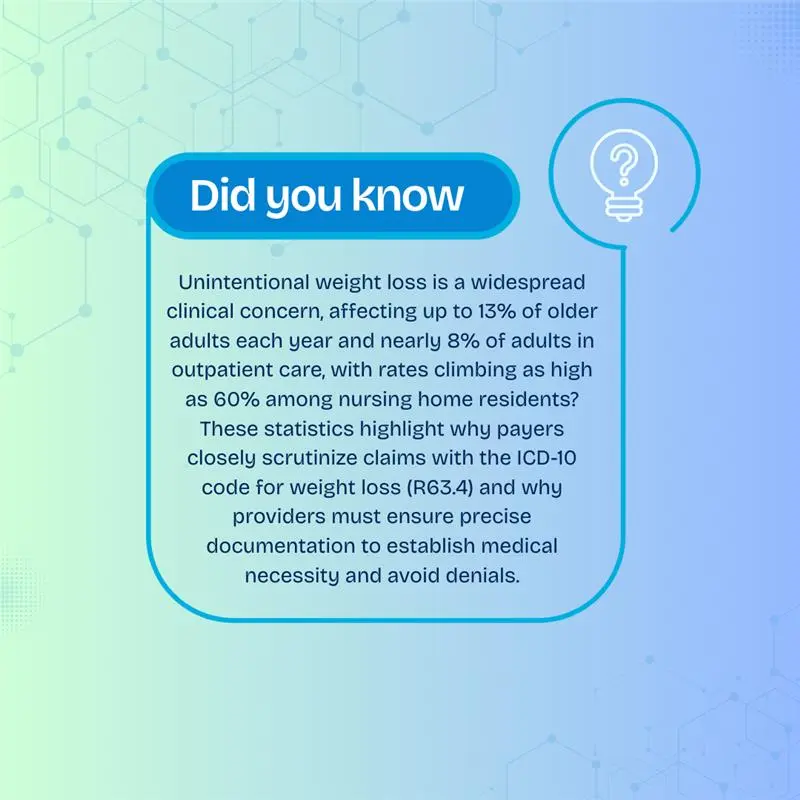Why Weight Loss Coding Matters in 2025
Weight loss is a clinical finding that can indicate a wide range of underlying medical conditions, from metabolic disorders to chronic diseases and even psychosocial factors. In medical billing and coding, accurate use of the ICD 10 code for weight loss is critical for ensuring clean claim submission, compliance with payer rules, and avoiding unnecessary denials. In 2025, payers have heightened scrutiny over nonspecific codes, making it more important than ever to apply correct documentation standards when reporting weight loss.
What is Weight Loss in Clinical Terms?
Clinically, weight loss is defined as a reduction in body mass that is either intentional (diet, exercise, medical treatment) or unintentional (disease-related). Unintentional weight loss is especially important in coding and billing because it often signals an underlying pathology.
Symptoms Commonly Associated with Weight Loss
- Unexplained drop in body mass
- Fatigue and weakness
- Nutritional deficiencies
- Secondary symptoms based on underlying cause (e.g., malabsorption, thyroid disorders, malignancy)
Proper documentation of these symptoms allows coders to determine if ICD 10 code for weight loss (R63.4) is appropriate or if a more specific code should be used.

What is the ICD 10 Code for Weight Loss?
The official ICD 10 code for weight loss is:
R63.4 – Abnormal weight loss
This code is used when weight loss is documented but not otherwise specified as intentional or tied to a more specific underlying condition.
Billable Code: Yes
Category: Symptoms and signs involving food and fluid intake
Use Case: Applied when the provider documents “abnormal” or “unexplained weight loss” without a definitive diagnosis at the time of the visit.
When to Use ICD 10 Code for Weight Loss (R63.4)
Coders should use R63.4 in cases where:
- The provider documents “abnormal weight loss” or “unintentional weight loss.”
- No definitive diagnosis explains the symptom at the time of service.
- The weight loss is clinically significant enough to warrant evaluation or treatment.
When Not to Use R63.4
Do not use the ICD 10 code for weight loss when:
- The weight loss is intentional, such as through a medically supervised diet or bariatric program. (Instead, use Z codes like Z71.3 – Dietary counseling and surveillance).
- The weight loss is clearly linked to another diagnosis (e.g., E10.9 – Type 1 diabetes mellitus without complications or C15.9 – Malignant neoplasm of esophagus).
- The documentation specifies cachexia (use R64 – Cachexia).
Related ICD 10 Codes Used with R63.4
| ICD-10 Code | Description | When Used |
|---|---|---|
| R63.4 | Abnormal weight loss | Primary code when unexplained or unspecified |
| R64 | Cachexia | Severe wasting syndrome due to chronic disease |
| R63.5 | Abnormal weight gain | Opposite symptom, often relevant in comparative coding |
| E43 | Unspecified severe protein-calorie malnutrition | If documented as malnutrition |
| E66.9 | Obesity, unspecified | Contrast diagnosis when weight change is due to obesity |
| Z71.3 | Dietary counseling and surveillance | When weight loss is intentional under medical guidance |
Why Claims with ICD 10 Code for Weight Loss Get Denied
1. Nonspecific Documentation
If a provider simply writes “weight loss” in the encounter note without describing duration, severity, or clinical suspicion, payers consider the documentation inadequate. For example:
Incorrect: “Patient presents with weight loss.”
Correct: “Patient lost 12 lbs over the past 2 months without changes in diet or exercise. Associated fatigue and anorexia noted.”
👉 Without quantitative detail (amount of weight lost, time period) and qualitative context (associated symptoms), payers often deny claims for lack of specificity.
2. No Supporting Clinical Evidence
R63.4 is expected to be supported by measurable data. Denials occur when claims lack documentation such as:
BMI valuesv and trends
Nutritional or dietitian assessments
Lab results (CBC, thyroid panel, metabolic panel)
Imaging or referrals (CT, oncology workup, GI referral)
👉 Payers expect that unexplained weight loss is investigated. If no supporting evidence exists in the record, the claim risks denial for medical necessity not met.
3. Linked to Intentional Weight Loss
One of the most frequent denial reasons is misuse of R63.4 for patients who are intentionally losing weight. For example:
Post–bariatric surgery follow-up
Documented dietary programs for obesity
Lifestyle-driven weight reduction efforts
👉 In such cases, payers deny claims because R63.4 is reserved for abnormal or unintentional weight loss, not planned interventions. Providers must code obesity (E66.9) or other relevant diagnoses instead.
4. Standalone Use Without Related Conditions
Weight loss is rarely considered a primary diagnosis on its own. If submitted without linkage to an additional condition, payers may deny the claim as incomplete. For example:
Denied Claim: ICD 10 R63.4 submitted with CPT 99213 (office visit) as the sole diagnosis.
Approved Claim: R63.4 submitted with additional codes like C80.1 (neoplasm, unspecified) or F32.9 (depression).
👉 The absence of etiology, comorbidity, or secondary coding signals to payers that the case does not establish medical necessity, resulting in denial.
How to Avoid Denials
- To minimize denials related to ICD 10 code R63.4, providers must:
- Document weight change trends (lbs/kg lost + timeframe).
- Specify whether the weight loss is intentional or unintentional.
- Provide supporting evidence (BMI, labs, clinical findings).
- Link the symptom to underlying conditions or referrals.
- Use R63.4 only when medically appropriate, not as a placeholder.
By combining accurate documentation with correct coding practices, providers can justify medical necessity and prevent costly revenue leakage.
Documentation Requirements for R63.4 (ICD 10 Code for Weight Loss)
1. Specify “Unintentional” or “Abnormal”
Providers must clearly state whether the weight loss is unintentional, unexplained, or abnormal, since payers differentiate between medically significant weight changes and intentional ones. R63.4 should never be used for cases where weight reduction is due to diet, exercise, or bariatric surgery, as that falls under separate Z-codes or obesity-related codes. Without this clarification, claims are at high risk of rejection.
2. Document Duration and Degree
The extent and timeframe of weight loss must be quantified in the record, for example: “patient lost 15 lbs (10% of body weight) over the last 6 months.” This level of detail helps establish the abnormality as clinically relevant, and supports medical necessity when billing. Vague statements like “weight loss present” are insufficient and lead to denials, especially when payers require measurable benchmarks.
3. Capture Associated Symptoms
Unintentional weight loss often occurs with other clinical signs such as fatigue, loss of appetite, malabsorption, or systemic illness. Linking R63.4 with related symptoms provides a clearer clinical picture for auditors and payers, strengthening the claim. Omitting such details may make the condition look isolated or non-medically significant, reducing the likelihood of reimbursement.
4. Note Differential Diagnoses
Since unexplained weight loss is usually a symptom of an underlying condition (e.g., cancer, hyperthyroidism, depression, malnutrition), documentation should reflect that providers are considering or ruling out potential causes. Listing suspected diagnoses alongside R63.4 demonstrates clinical judgment, helps coders select correct secondary codes, and prevents payers from flagging the claim as incomplete.
5. Provide BMI or Anthropometric Data
Objective measures like BMI trends, body fat percentage, or serial weight records should be included whenever possible. These serve as quantifiable evidence to support that the loss is clinically significant rather than subjective. For example, noting a drop from BMI 24 to 20 within a year adds weight (literally) to the claim, making it harder for payers to dispute.
6. Clarify Intentional Weight Loss
If weight reduction is due to lifestyle changes, medical diets, or surgical interventions, this must be documented and coded differently (using obesity or Z-codes). Using R63.4 in these cases misrepresents the clinical scenario and almost always results in denials. Providers should clearly distinguish between therapeutic weight reduction and pathological loss to guide coders correctly.
7. Coder Review of Clinical Records
Coders should carefully review progress notes, nutrition consults, and lab reports before assigning R63.4. This ensures that documentation supports the abnormality, avoids miscoding, and complies with payer guidelines. Coders should also confirm that linked CPT/HCPCS services (such as nutrition therapy or lab testing) align with the diagnosis to prevent mismatch-based denials.
How to Read Key Sections in Payer EOBs for Weight Loss Claims
When providers bill with ICD-10 code R63.4 (Abnormal Weight Loss), the Explanation of Benefits (EOB) becomes the first checkpoint for understanding payment outcomes. The allowed amount shows what the payer considers reimbursable, while adjustments reveal reductions tied to policy rules or contractual agreements.
Beyond payment numbers, the most important part is the remark codes. Payers often flag issues like “diagnosis not specific enough,” “documentation does not support medical necessity,” or “service not covered for this diagnosis.” These codes explain why a claim was reduced or denied.
Coders and billers should cross-check billed charges, allowed amounts, and remark codes line by line. This step helps identify if the denial stems from missing documentation, coding misuse, or payer-specific policy exclusions allowing the team to correct the claim or prepare a strong appeal.
PRO-MBS: How We Help Providers Bill Weight Loss Codes Accurately
Our Pro-MBS specializes in navigating coding challenges for symptom-based claims like R63.4 (ICD 10 code for weight loss). Our expert billers and coders ensure:
- Precise Coding: Correct use of R63.4, R64, and related codes to reflect true clinical findings.
- Audit-Proof Documentation: Guidance for providers on how to document duration, severity, and underlying conditions.
- Denial Management: Proactive appeal strategies when payers deny weight loss claims.
- Revenue Cycle Optimization: Seamless integration of symptom-based coding into broader RCM workflows.
Partner with Pro-MBS to reduce denials and maximize reimbursement for weight loss-related encounters.



